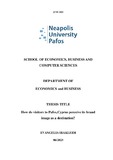| dc.description.abstract | The main objective of this research is to gain a deeper understanding of the perceptions, preferences, and experiences of visitors to Pafos, by developing a robust theoretical foundation.
The methodology employed in this study is quantitative, utilizing a close-ended questionnaire as the only data collection tool. The questionnaire is designed based on Anholt's GMI City Brand Index, incorporating dimensions such as awareness, familiarity, associations, perceived quality, and preference and its distribution was achieved predominantly via email to a targeted sample of individuals interested in the destination, ensuring convenient and widespread participation.
The findings of the study reveal significant correlations between different demographic variables and the various dimensions of the City Brand Index. For instance, it was observed that younger participants exhibited higher familiarity and preference for the destination, while participants that show a preference for the weather in Pafos had more positive associations with the city. Moreover, the study identified the perceived quality of infrastructure and cultural attractions as key drivers of overall destination attractiveness.
Based on the findings, it can be concluded that destination branding plays a crucial role in shaping the perceptions and preferences of visitors.
The conclusions drawn from this research contribute to the existing body of knowledge in the field of destination branding and image. The study provides valuable insights into the factors influencing destination attractiveness and offers practical implications for destination management organizations and marketing professionals. By understanding the correlations between demographic variables and destination perceptions, stakeholders can develop tailored strategies to effectively promote and position the destination in the competitive tourism market. | en_UK |

